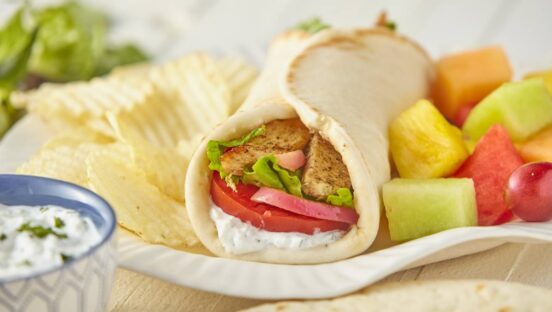It was supposed to be a big year for Chicken Salad Chick. The brand already had 100-plus locations, but planned to open 50 additional stores by the end of 2020—that is, until the pandemic demanded a reassessment.
Chicken Salad Chick is just one of countless emerging restaurant companies that are trading expansion plans for survival strategies. The Alabama-based concept had to ensure that its existing restaurants, which are 70 percent franchisee-operated, could survive under new guidelines.
“Our team immediately had to shift its focus to reacting to all the municipalities and different state ordinances that were being put out,” says Scott Deviney, president and CEO of Chicken Salad Chick.
Corporate has ramped up communication with franchisees to share information about time-sensitive topics like Paycheck Protection Program loans or marketing initiatives. Chicken Salad Chick’s marketing team also sends out nightly marketing recaps, alerting franchisees of media trends like the Great American Takeout or Triple Points Day.
One particular media trend that mutually benefited Chicken Salad Chick and the community was the brand’s donation efforts to healthcare workers. At participating restaurants, customers were able to purchase meals for frontline employees, which were then dropped off at hospitals. Deviney says this business solution could have success beyond the pandemic, as it could be used to apply to teachers and other community members.
The greatest product change was Chicken Salad Chick’s reliance on its grab-and-go platform, Quick Chick. The Quick Chick’s pound and half-pound offerings made it ideal for customers wanting a long-lasting, bulk option. Family-meal packs especially made it a home-friendly choice.
Chicken Salad Chick had to get creative in its off-premises solutions, as over half of its locations don’t have drive thrus. Owners took advantage of their restaurants’ parking lots and set up makeshift drive thrus. As cars came into the parking lot, employees took orders under tents with their tablet POS systems.
“We basically have had these pop-up drive thrus that helped bring in more business, because people see you’re open,” Deviney says. “It’s been interesting to watch all the cars pull up.”
Though Chicken Salad Chick corporate shares ideas and resources with its franchisees, sometimes franchisees come up with their own survival tactics. Franchisees Kathleen and Ron Ram found so much success in their solution that their location placed within the top five Chicken Salad Chicks for sales during the height of COVID-19.
The idea started when their dining room in Katy, Texas, closed. Kathleen took informal orders from her friends and delivered them to their neighborhoods. Soon, word spread and the Rams started doing community drop-offs, where customers pre-ordered their meals and picked it up at predetermined locations.
Ron says as many as 60–70 cars showed up at these drop-off spots. Even in communities they had never visited before, the Rams saw a huge demand for Chicken Salad Chick. Social media—especially Facebook—helped spread awareness and encouraged first-time customers to try the product. Online-ordering forms further facilitated efficiency for potential consumers.
The momentum created from the drop-off phenomenon gave the Rams confidence to open their second Chicken Salad Chick branch in June. It was the first Chicken Salad Chick to open in the pandemic.
“Where there’s a will, there’s a way. If we can do the numbers we did during this, then I feel like we can do anything,” Kathleen says. “When something like this happens, you just have to think outside the box. That’s how we were able to be successful instead of just sitting around.”
While Chicken Salad Chick built itself to weather the COVID-19 storm, other emerging brands had already pivoted for an off-premises future years prior. For Nebraska-based Scooter’s Coffee, the trend for quick, drive thru–focused service has been a long time coming.
“We hung our hat on drive-thru coffee 20 years ago. We actually want to fortify our position in that regard and focus on becoming the best in the world at drive-thru coffee,” says Scooter’s CEO Todd Graeve. “There’s no doubt that the drive-thru model has some strength is something like this.”
Most of Scooter’s 275 stores are drive-thru-only, emphasizing speed and efficiency to keep customers coming back. But one adjustment Scooter’s and other coffee chains had to make was dealing with the changing consumer habits. Despite coffee being a recession-friendly product, many people lost their morning routines, which included a visit to Scooter’s. Graeve says the spike in sales shifted from the morning rush to the afternoon.
To help with staffing and drive more business, Scooter’s is redeveloping its ordering process by exploring new methods of payment, like touchless transactions. The biggest frontier for the company is its mobile app. Graeve says technological developments will have to balance systems that keep the business connected with customers.
“I want to be careful for our leadership team that we don’t allow complexity to disrupt something that’s working, yet being innovative at the same time,” Graeve says.
If emerging franchises can survive the onslaught of the pandemic, there are countless opportunities waiting on the other side. Technological changes and available real estate will attract new franchisees, who will want to work with brands that can thrive during bleak circumstances.
“There’s a number of ways that you can unpack becoming a world-class franchisor,” Graeve says. “It really then comes down to: What are we doing to stay innovative?”






